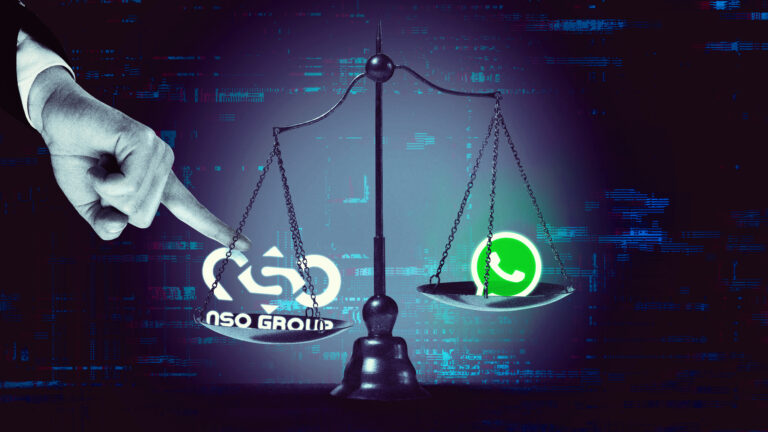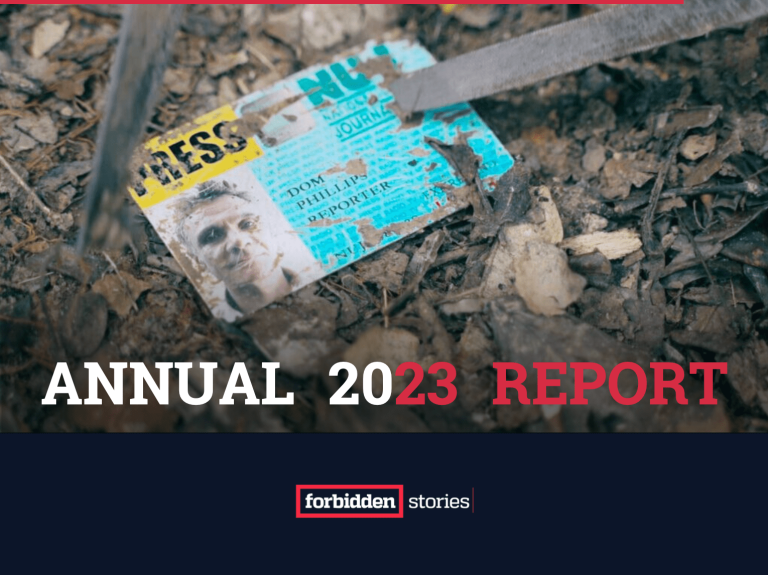Journalist spied on in Morocco: Omar Radi’s “descent into hell”
In the weeks following the coordinated publication of an Amnesty International report alleging spying into his cell phone, Moroccan journalist Omar Radi was brought in for police questioning two times, accused of espionage. He was then arrested alongside a colleague while leaving a bar after an altercation with a pro-government cameraman who had been harassing him for several weeks. The most recent episode in the wild saga: just one day after his release, he was again summonsed by the police.
By Phineas Rueckert and Cécile Schilis-Gallego
“More than ever before, we are witnessing the depth of hate the state shows toward anyone who demonstrates a difference of opinion, as well as the maliciousness and manipulation toward those who are living in freedom.”
On the evening of July 6, Moroccan journalist Omar Radi took to Facebook to speak his mind. It was a bold decision, seeing as just hours earlier he had been in police custody.
The night before, Radi and colleague Imad Stitou were arrested after an altercation while leaving a bar in Casablanca. The two journalists spent the night in jail before being transported to the police headquarters for questioning the next day. Charged with filming people without their consent, public drunkenness and slander, they were released on Monday afternoon.
The arrest came as the culmination of weeks of accusations against Radi by the Moroccan state and illustrates the increasing danger of being a journalist in Morocco, Radi and other journalists and human rights defenders told Forbidden Stories.
Accusations against Radi by the authorities have escalated since the publication of a June 22 Amnesty International report alleging the repeated targeting of his phone by spyware produced by the Israeli firm NSO Group.
Forbidden Stories and 16 media partners obtained exclusive access to the report, which identified five presumed attacks against the journalist’s phone between January 2019 and January 2020 by so-called “network injection,” a highly-sophisticated and almost-undetectable spyware attack.
The Moroccan state is suspected to have ordered the attacks against Radi’s phone, which allowed targeters not only to access personal data and messages but also to activate the phone’s camera and microphone remotely.
But according to the Moroccan state’s version, it was Radi himself who was doing the spying.
In the weeks after the report was published, Radi was called in for questioning on June 25 and July 2. The Moroccan authorities have opened up an investigation into the journalist, accusing him of “receiving foreign funds” for performing “intelligence services.”
“Two summons in two weeks, that’s judicial harassment,” Radi said. “In one year, I’ve been attacked, arrested, put in prison, investigated and besmirched by the press.”
“The criminalization of journalism has reached new and much more serious levels,” he added.
On July 7, just one day after he was released, Radi was again summonsed by the police for the following day.
“Total ambush”
Radi’s arrest took place around 11 p.m. on the night of July 5, in the wake of a heated interaction with a journalist from the pro-government site ChoufTV, according to Le Desk, which gathered a number of eyewitness accounts of what happened.
As area bars shut down for the evening, Radi found himself confronted by Karim Alaoui, a cameraman at ChoufTV. Alaoui had been filming Radi for several weeks — including, notably, during his two summons to the police headquarters — and was at a nearby bar with his wife, who also works for the pro-government site, and son.
Screenshot of a ChoufTV video published after the altercation between Omar Radi and their cameraman.
According to Le Desk’s eyewitness account, Alaoui began to film Radi and Stitou as they left the bar. The two journalists in return began to film Alaoui with their smartphones. It was then that the Chouf TV employee “got out of his car and began to yell at the journalists,” accusing Radi and Stitou of attacking him while he was in the presence of his family, Le Desk wrote.
“Less than a minute later,” according to Le Desk, a police van arrived at the scene, picking up Radi, Stitou and the two ChoufTV reporters.
“It was a total ambush,” said Ali Amar, the editor-in-chief of Le Desk.
In the police van, Radi recorded several voice messages in which he recounted the arrest. In them, he refused to give the authorities his phone, calling it an “aggressive arrest.”
ChoufTV, which had for weeks engaged in a smear campaign against the journalist, also published a video of the altercation, calling Radi a “spy” and accusing him of violently attacking Alaoui while under the influence of alcohol.
Support us so that we can continue investigating
We need your help to expose what the enemies of the press try to keep quiet.
A sustained smear campaign
This was not the first time the sensationalist website had attacked Radi. Even before the publication of Amnesty’s report, ChoufTV started to publish an increasing number of articles containing personal information about Radi, including his bank details and the identity of his roommate.
“They published a large number of articles accusing [Radi] of rape and theft, but also accusing him of not paying his water and electricity bills,” Amar said. “They’re taking out all the stops. They’re presenting him as an irresponsible, alcoholic journalist who attacked a cameraman doing his job.”
A ChoufTV video published on July 6 shows the cameraman along with his wife and son. The headline reads: “They attacked us when they were drunk and we were terrified.” In the video, the cameraman also accuses the journalists of hitting him in front of his crying son.
ChoufTV and director Driss Chatane did not respond to multiple requests for comment.
Other media organizations close to power in Morocco have also launched smear campaigns against Radi in the days following the publication of the Amnesty Report. French language site Le 360 speculated that Radi had ties to MI6, the UK’s intelligence agency.
The journalist replied that he simply written an article about “the financial situation of a private Moroccan company” for a consultancy firm that “currently has a British Foreign Office pensioner on staff, who left in 2011.”
Le360 was called out by Le Monde for its proximity to the government and questionable journalistic scruples.
NSO presence in Morocco
The smear campaigns against Radi were leveled just weeks after the publication of Amnesty’s damning report, which showed how the Moroccan government allegedly used NSO Group spyware against the journalist.
Amnesty had previously reported a number of similar attacks against historian Maati Monjib and human rights defender Adbessadak El Bouchattaoui in 2019.
The type of attack, which Amnesty has attributed to NSO Group, is called “network injection.” The method used is particularly nefarious, taking place over a matter of milliseconds and, to a distracted eye, without leaving a trace. All targets have to do is click through to a non-encrypted (HTTP instead of HTTPS) website. As they do so, their mobile 4G/LTE internet traffic is redirected to another website that installs the spyware before rerouting the target back to the original site they had attempted to access.
Citizen Lab, an organization that investigates spyware attacks against civilians, identified Morocco among the 45 countries that have reportedly used NSO Group’s technology since 2018, which is also known as “Pegasus.”
NSO Group has reportedly used a number of technologies against civil society members.
In 2019, Citizen Lab revealed that NSO Group had successfully taken advantage of a flaw in the encrypted messaging system WhatsApp to infect targets simply through missed calls in the app. Moroccan journalist Aboubakr Jamaï was one of the reported targets, and recently, along with a number of journalists and activists, signed a petition calling on the government to investigate allegations of spying against them.
Ignore and deny
Faced with these accusations, the Moroccan government has not strayed from its line of defense. “The Kingdom of Morocco does not need to refute these allegations, and challenges those who bring them to supply the evidence,” spokesperson Saaid Amzazi said in a statement denouncing the “unfair international defamation campaign” against Morocco.
For the past two weeks, the authorities have repeated at press conferences and in several press releases that they were never contacted by the authors of the Amnesty report. The NGO denies this and claims to have sent unanswered requests on June 9 to five Ministry of Human Rights officials.
Protect your stories
Are you a journalist under threat because of your reporting? Secure your information with Forbidden Stories.
Contacted on multiple occasions by Forbidden Stories regarding the publication of the June 22 report, the authorities did not respond. Forbidden Stories again contacted the authorities, requesting an interview with the Prime Minister, but has still not received an answer.
According to Heba Morayef, the director of Amnesty International’s Middle East and North African branch, this is “not the first time that efforts have been made to undermine Amnesty’s work.”
The state’s denials, she said, “coincide with an increase in repression in the country.”
Omar Radi was given a suspended four-month prison sentence for a tweet in which he called a judge an “executioner” for his sentencing of several members of an opposition group called Hirak el-Rif.
Since the revelations about the use of NSO’s spyware were released in the international press, the government has seemed to switch tack, now accusing Radi of espionage. The authorities have accused him of intelligence with foreign powers on account of funds he received from two consulting firms. Between 2018 and 2019, Radi completed two risk analysis reports based on public data for the private firms K2 Intelligence and G3 Good Governance Group. The journalist said he was paid $400 and $1,400 for the reports, respectively. He explained that he carried out a number of consulting assignments as a business reporter, including producing analyses and translating them into Arabic.
“These accusations are not only unfounded, but ridiculous,” Radi said. “In addition, the investigation is based on information published in pro-government sites that had been given to them by Moroccan intelligence agencies.”
He decried a “troubling descent into hell for journalists whose most basic work is criminalized.”
A growing phenomenon
Accusing journalists of spying is a common tactic to silence them, and has increased in recent years, journalists and human rights defenders say.
In 2018, an Algerian blogger was sentenced to 10 years in prison for “connections to foreign agents” — the same charges leveled against Radi — after publishing an interview with an Israeli diplomat on his website. The year before, a fixer had been accused of the same crime.
More recently, in Lebanon, an activist was targeted on charges of visiting Israel and “dealing with spies of the Israeli enemy.” She denies ever going to the Hebrew state. “The use of accusations of journalists being spies or ‘Western agents’ is not a new one,” said Alia Ibrahim, a journalist for the Lebanese site Daraj and a member of the Forbidden Stories consortium. “The government has always used it to intimidate, and on a number of occasions, falsely accuse journalists and activists, but more recently the number of cases has risen dramatically and disquietingly.”
“The authorities prefer to use this accusation since they know that the public will never support foreign ‘agents’ and traitors,” she added.
Amar, at Le Desk, also said that this type of campaign works and decried the lack of solidarity amongst other journalists in Morocco.
“We don’t have public support,” he said. “We don’t feel any sort of solidarity — certainly not from all our journalist colleagues. People don’t want to get involved in a case where they can clearly see that the state has it in for a certain journalist.”
À lire aussi








